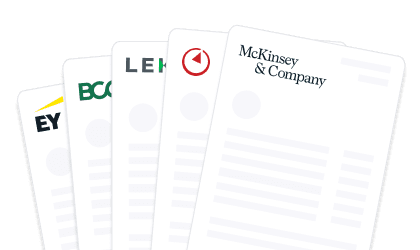Soft Skills for Consulting: Why They Matter and How to Develop Them
Discover the importance of soft skills in the consulting industry and learn how to develop them with our comprehensive guide.
Posted June 13, 2025

Join a free event
Learn from top coaches and industry experts in live, interactive sessions you can join for free.
Table of Contents
Consulting is a dynamic and ever-changing industry that requires professionals to demonstrate both technical and interpersonal skills to succeed. While technical or hard skills are essential, soft skills play a critical role in determining the success of consultants. Soft skills refer to a set of personality traits, social behaviors, and communication abilities that allow individuals to work and interact effectively with others. In this article, we discuss the importance of soft skills in consulting, what they are, how they differ from hard skills, and the key skills needed for consultants to excel in their profession. We also delve into strategies for developing soft skills and their impact on the consulting industry.
The Importance of Soft Skills in Consulting
Soft skills are essential for success in consulting because the consulting industry is primarily based on solving complex business problems. Consultants work with clients from diverse cultural backgrounds, industries, and sectors, and as such, they need to communicate effectively, build relationships, show empathy, and navigate complex situations. Soft skills, such as communication, problem-solving, emotional intelligence, and adaptability, enable consultants to build trust, inspire collaboration, and find common ground with clients and colleagues.
Moreover, soft skills are crucial for consultants to manage their own stress and workload. The consulting industry is known for its long hours, tight deadlines, and high-pressure environments. Therefore, consultants need to have strong time management skills, the ability to prioritize tasks, and the resilience to handle stress. Soft skills such as self-awareness, self-regulation, and stress management can help consultants maintain their mental and emotional well-being, which is essential for their long-term success in the industry.
Finally, soft skills are becoming increasingly important in the consulting industry due to the rise of automation and artificial intelligence. While technology can automate many routine tasks, it cannot replace the human touch that is required for effective consulting. Soft skills such as creativity, critical thinking, and innovation are essential for consultants to provide unique and valuable insights to clients. Consultants who can combine their technical expertise with strong soft skills will be in high demand in the future of consulting.
What are Soft Skills?
Soft skills refer to a set of personal attributes and social behaviors that enable individuals to interact effectively with others. Some of the top soft skills necessary for consulting include communication, problem-solving, emotional intelligence, adaptability, time management, organizational skills, and relationship-building.
Soft skills are becoming increasingly important in the workplace, as they are often the determining factor in an individual's success. Employers are looking for candidates who not only have the technical skills required for the job, but also possess strong soft skills. In fact, a study by LinkedIn found that 57% of leaders say soft skills are more important than hard skills.
Soft skills can be developed and improved over time through practice and experience. One effective way to improve soft skills is through training and workshops. Many companies offer soft skills training programs to their employees to help them develop the necessary skills to succeed in their roles.
How Do Soft Skills Differ from Hard Skills?
Hard skills refer to technical skills and knowledge that are specific to a particular job or industry. For instance, technical knowledge or specific industry experience may be critical for a consultant to understand the client's business and provide relevant solutions. However, soft skills such as communication, emotional intelligence, and adaptability are essential to help consultants interact effectively with clients, understand their needs, and maintain positive relationships.
Soft skills are also transferable skills that can be applied to various industries and job roles. For example, effective communication skills are essential not only for consultants but also for managers, team leaders, and customer service representatives. Similarly, adaptability and problem-solving skills are valuable for employees in any industry, as they help individuals navigate changes and challenges in the workplace.
Moreover, soft skills are often difficult to measure and quantify, unlike hard skills that can be assessed through tests or certifications. Soft skills are developed through experience, practice, and feedback, and they require continuous improvement and refinement. Therefore, individuals who possess strong soft skills are highly valued by employers, as they can contribute to a positive work environment, enhance team collaboration, and improve customer satisfaction.
Key Soft Skills for Consultants
Effective communication is one of the most critical soft skills for consultants. As a consultant, you need to convey complex ideas to clients in a clear, compelling, and concise manner. Emotional intelligence is also vital for consultants to understand and manage their emotions and relationships effectively. Consultants should demonstrate strong problem-solving and critical thinking skills to help clients identify business problems, devise effective solutions, and implement them successfully. Other critical soft skills for consultants include adaptability, time management, organizational skills, and relationship-building.
Another essential soft skill for consultants is leadership. As a consultant, you may be leading a team of professionals or guiding clients through a project. Therefore, you need to have strong leadership skills to inspire and motivate your team or clients towards achieving their goals. Additionally, consultants should possess excellent analytical skills to analyze data, identify trends, and make informed decisions. Finally, consultants should have a strong work ethic, be self-motivated, and have a positive attitude towards their work. These qualities will help consultants to deliver high-quality work and build a positive reputation in the industry.
Communication: The Foundation of Successful Consulting
Communication is the backbone of effective consulting. Consultants need to communicate effectively with their clients and stakeholders to understand their needs, identify business problems, and devise solutions that meet their specific requirements. Consultants should be able to listen actively, ask relevant questions, and respond appropriately. Effective communication skills enable consultants to build trust, manage conflicts successfully, and maintain positive relationships.
Moreover, effective communication is not limited to verbal communication. Consultants should also be able to communicate effectively through written communication, such as reports, emails, and presentations. Clear and concise writing skills are essential for consultants to convey complex information in a way that is easily understandable for their clients and stakeholders. Additionally, consultants should be able to use visual aids, such as graphs and charts, to present data and information in a way that is easy to comprehend. Effective written and visual communication skills are crucial for consultants to deliver successful projects and achieve their clients' goals.
Emotional Intelligence: Essential for Effective Consulting
Emotional intelligence is the ability to recognize, understand, and manage emotions. Consultants with high levels of emotional intelligence are better equipped to navigate complex business situations, build strong relationships, and inspire cooperation and collaboration. Emotional intelligence also helps consultants manage stress, remain calm under pressure, and adopt a positive attitude towards clients and colleagues.
Furthermore, emotional intelligence allows consultants to effectively communicate with clients and colleagues, as they are able to understand and empathize with their perspectives and emotions. This can lead to more successful outcomes and stronger partnerships. Additionally, consultants with high emotional intelligence are often better at resolving conflicts and negotiating, as they are able to remain level-headed and find mutually beneficial solutions. Overall, emotional intelligence is a crucial skill for consultants to possess in order to excel in their roles and provide the best possible service to their clients.
Problem-Solving and Critical Thinking: Key Competencies for Consultants
Problem-solving and critical thinking skills enable consultants to identify business problems, analyze data, and develop actionable insights. Consultants who can solve complex problems effectively can provide valuable solutions that address the client's specific needs. Critical thinking also helps consultants assess and evaluate information, ask relevant questions, and identify potential roadblocks and barriers.
Adaptability: Navigating Change in the Consulting Industry
Adaptability is the ability to adjust to new situations and changes in the work environment. The consulting industry is constantly evolving, and consultants need to adapt to these changes to provide relevant solutions and add value to clients. Consultants who can respond quickly to change can remain competitive and stay ahead of the curve. Adaptability also enables consultants to learn new skills, work with new clients, and navigate unfamiliar environments.
Time Management and Organizational Skills: Making the Most of Every Minute
Time management and organizational skills are vital for consultants to manage their workload, meet deadlines, and complete tasks effectively. Consultants need to prioritize their work, delegate tasks where necessary, and manage their time effectively. Good organization skills also enable consultants to access relevant information quickly and efficiently, maintain accurate records, and work collaboratively with colleagues and clients.
Building Rapport with Clients: The Key to Long-Term Success as a Consultant
Building rapport with clients is essential for consultants to succeed in the long term. Effective relationship-building helps consultants establish trust, communicate clearly, and understand clients' needs. Consultants who can build strong relationships with clients are more likely to receive repeat business, referrals, and positive feedback. Building rapport also helps consultants to anticipate clients' needs, provide personalized solutions, and add value to clients.
Developing Your Soft Skills: Tips and Strategies for Improvement
Developing soft skills requires a continuous improvement mindset and a commitment to growth. Some of the strategies for improving soft skills include attending training programs, participating in networking events, seeking feedback, reading relevant literature, and seeking mentorship. Also, it's vital to practice self-reflection and identify areas for improvement continuously.
Training and Education Options for Developing Soft Skills
Training and education programs can help consultants improve their soft skills. Organizations can provide soft skill training programs to their employees, or consultants can enroll in various online courses or attend workshops. It's essential to choose the right training courses that cater to specific soft skills and align with career goals.
Impact of Technology on Soft Skill Development in Consulting
The advancement of technology has a significant impact on soft skills development in consulting. Consultants can leverage technology for communication, collaboration, problem-solving and time management. Technology also enables consultants to provide real-time solutions, improve data analysis and enhance their decision-making skills. However, technology has also led to the creation of virtual work environments, which requires consultants to develop new communication and collaboration strategies.
Measuring the ROI of Developing Soft Skills in Consulting
Measuring the ROI of developing soft skills in consulting is challenging but vital. It's critical to measure the impact of soft skill development on business outcomes such as increased productivity, client satisfaction, and revenue growth. Data, such as testimonials from clients or colleagues, performance reviews, and surveys, can provide valuable insights on the effectiveness of soft skills development programs.
Conclusion: Emphasizing the Importance of Soft Skills in Consulting
Soft skills play a vital role in successful consulting careers. Effective communication, emotional intelligence, problem-solving critical thinking, adaptability, time management, organizational skills, and relationship-building are some of the essential soft skills for consultants. Developing soft skills requires continuous improvement, training, and education. Ultimately, consultants who excel in soft skills are more likely to build positive relationships with clients, provide innovative solutions, and succeed in the consulting industry.
Browse hundreds of expert coaches
Leland coaches have helped thousands of people achieve their goals. A dedicated mentor can make all the difference.



























